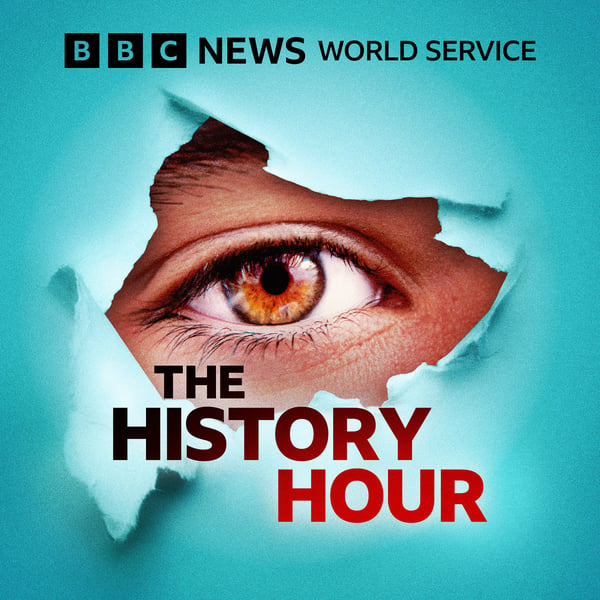Finding early vertebrate’s footprints and the Deaflympic badminton champion
The History Hour
BBC
4.4 • 879 Ratings
🗓️ 16 March 2024
⏱️ 52 minutes
🧾️ Download transcript
Summary
First, we go back to 1992, when off the coast of Ireland, a Swiss geology student accidentally discovered the longest set of footprints made by the first four-legged animals to walk on earth.
They pointed to a new date for the key milestone in evolution, when the first amphibians left the water 385 million years ago.
Dr Frankie Dunn, who is a senior researcher in palaeobiology at the Oxford University Museum of Natural History in the UK, then dives into landmark discoveries in geological history.
Plus, the story of Winifred Atwell, a classically-trained pianist from Trinidad who was admired by Queen Elizabeth II and Sir Elton John. She became one of the best-selling artists of the 1950s in the UK.
Then, how the Guarani, an indigenous language of South America, was designated an official language in Paraguay’s new constitution, alongside Spanish.
Also, the lesser known last eruption of Mount Vesuvius in 1944.
Finally, Indian badminton player Rajeev Bagga who has won 14 gold medals at the Deaflympics. In 2001, he was given the ‘Deaflympian of the Century’ award.
Contributors: Iwan Stössel - Swiss Geologist. Dr Frankie Dunn - Senior Researcher in Palaeobiology at the Oxford University Museum of Natural History in the UK. David Olivera - Paraguayan Linguist and Anthropologist. Angelina Formisano - Evacuated from the village of San Sebastiano during the 1944 eruption of Mount Vesuvius. Rajeev Bagga - Indian Badminton Player.
(Picture: Illustration of a tetrapod from the Late Devonian period. Credit: Christian Jegou/Science Photo Library)
Transcript
Click on a timestamp to play from that location
| 0:00.0 | Where to be a woman is the podcast celebrating the best of women's well being. |
| 0:05.0 | Listen now wherever you get your BBC podcasts. Hello and welcome to the History Hour Podcast from the BBC World Service with me Max Pearson |
| 0:19.7 | the past brought to life by those who were there. This week fighting to protect a South American |
| 0:24.9 | indigenous language. We were a team of 15 going each day to present our case to the 200 |
| 0:30.9 | or so delegates discussing the constitutional reforms, waiting for them by their offices, |
| 0:36.5 | to talk to them. |
| 0:37.5 | Plus the last big eruption of Mount Vesuvius. |
| 0:40.5 | There were explosions higher up, but it is the love I remember. That went everywhere, going in different directions. |
| 0:50.0 | We also have one of the world's greatest deaf sportsman and the life and times of the pianist |
| 0:54.6 | Winifred Atwell admired by Queen Elizabeth II and Sir Elton John. |
| 0:59.5 | And she would play, you know, pub songs and the poor people of Paris and she was the person that I really |
| 1:04.9 | love because she played the piano so joyously and she smiled. |
| 1:08.5 | That's coming up later in the podcast but before that we're going back to a moment which changed scientific understanding about how and when life first crawled out of the primordial swamp and up onto land. |
| 1:21.0 | In 1992 off the coast of Ireland, a Swiss geology student accidentally discovered |
| 1:26.2 | the longest set of footprints made by the first four-legged animals ever to walk on Earth. |
| 1:32.0 | They pointed to a key milestone in evolution. |
| 1:34.8 | Josephine McDermott has been hearing from Ivan Stosso, that Swiss student, about his amazing discovery. |
| 1:41.0 | If you looked careful at the imprints, you could recognize a larger one, a smaller one, a larger one, a larger one, a larger one, a larger one, a larger one, a really regular pattern. |
| 1:56.0 | Ivan Stursle is living out of a bed and breakfast hotel, |
| 1:59.4 | cycling each morning to take a boat or cross a bridge |
| 2:02.3 | to an island called Valencia in Kerry in the Republic of Ireland. |
| 2:06.0 | He has his orange field notebook with him. |
... |
Transcript will be available on the free plan in -380 days. Upgrade to see the full transcript now.
Disclaimer: The podcast and artwork embedded on this page are from BBC, and are the property of its owner and not affiliated with or endorsed by Tapesearch.
Generated transcripts are the property of BBC and are distributed freely under the Fair Use doctrine. Transcripts generated by Tapesearch are not guaranteed to be accurate.
Copyright © Tapesearch 2025.

